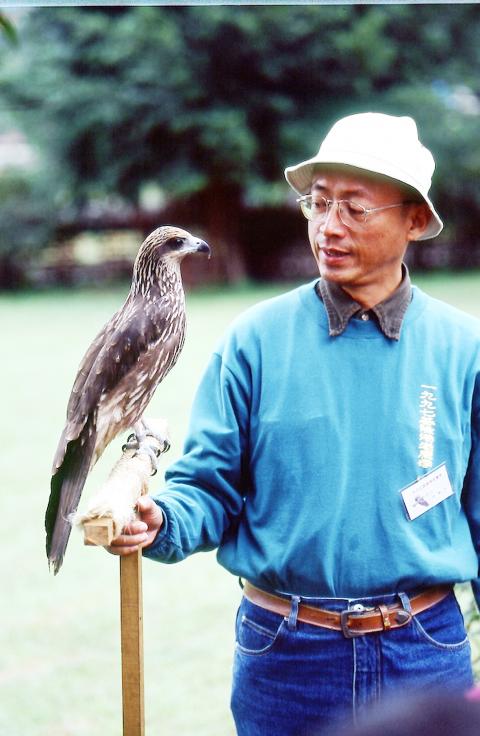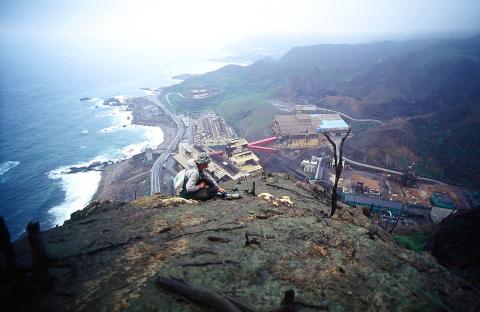A new documentary Fly, Kite, Fly (老鷹想飛) made by Taiwanese nature photographer Liang Chieh-te (梁皆得) depicts a bird-watcher who spent 20 years recording the behavior of black kites in Taiwan.
In 1991, Liang began accompanying Shen Chen-chung (沈振中) on his trips to observe the medium-sized raptor, and documented his activities for more than two decades, resulting in the 76-minute movie, that is to be released nationwide on Nov. 20.
In 1992, Shen, then 38, pledged to make a detailed account of the birds over the following 20 years, after he witnessed the 1991 disappearance of a group of black kites from Waimushan (外木山) in Keelung, according to the the producer of the documentary, the Taipei-based Raptor Research Group of Taiwan (RRGT).

Photo courtesy of Activator Marketing
Since then, Shen has traveled anywhere in Taiwan there were signs of black kites, from Keelung to Pingtung County. Choosing to keep his distance from the birds to avoid disturbing them, he carefully and quietly and faithfully wrote down his observations.
“Instead of saying I discovered them, it would be more appropriate to say they captured me and wanted me to record everything that happened to them,” Shen wrote in one of three of his books on black kites.
To further devote himself to his passion, Shen quit his job as a high-school teacher several years after he starting observing black kites.

Photo courtesy of Activator Marketing
Shen “would watch the sky through binoculars as the sun began to sink, counting each black kite one by one. He seemed to be taking an evening roll call of the raptor that belongs to the sky,” wrote Chiu Chun (邱惇) in a July 22 article on Shen published on news Web site CrowdWatch.
Chiu participated in fundraising efforts to support the documentary.
Writer, poet and conservationist Liu Ke-hsiang (劉克襄) compared Shen’s dedication and efforts to “conduct deep dialogues with the kites” to Jane Goodall’s long-term observation of chimpanzees in Africa.
Goodall’s “surprising experience of being treated as part of their [the chimps’] community also happened to Shen,” Liu wrote in an article published in August about his encounter with the bird-watcher.
According to the RRGT, black kites have flourished in neighboring countries, but not in Taiwan, where their total numbers have declined to about 300. The raptors were seen nationwide before the 1980s, but now they only inhabit the northern and southern tips of the island in small flocks, the RRGT said.
Shen’s observations inspired the government and the Institute of Wildlife Conservation at the National Pingtung University of Science and Technology to launch a study in 2010 on what had caused the decline of black kites in Taiwan.
During the study, a group of field investigators, students at the institute and RRGT members led by researcher Lin Hui-shan (林惠珊) found that the improper use of pesticides by farmers might have been one of the major culprits, the RRGT said.
Having filmed the documentary over 23 years, Liang aims to allow the audience access to the bird’s primitive mind and encourage awareness of the warning delivered by its dwindling numbers, the group said.
Wu Nien-jen (吳念真), a well-known scriptwriter, director and author, narrated the film, while the score was composed by Lim Giong (林強), a popular songwriter and pop singer.

An essay competition jointly organized by a local writing society and a publisher affiliated with the Chinese Communist Party (CCP) might have contravened the Act Governing Relations Between the People of the Taiwan Area and the Mainland Area (臺灣地區與大陸地區人民關係條例), the Mainland Affairs Council (MAC) said on Thursday. “In this case, the partner organization is clearly an agency under the CCP’s Fujian Provincial Committee,” MAC Deputy Minister and spokesperson Liang Wen-chieh (梁文傑) said at a news briefing in Taipei. “It also involves bringing Taiwanese students to China with all-expenses-paid arrangements to attend award ceremonies and camps,” Liang said. Those two “characteristics” are typically sufficient

A magnitude 5.9 earthquake that struck about 33km off the coast of Hualien City was the "main shock" in a series of quakes in the area, with aftershocks expected over the next three days, the Central Weather Administration (CWA) said yesterday. Prior to the magnitude 5.9 quake shaking most of Taiwan at 6:53pm yesterday, six other earthquakes stronger than a magnitude of 4, starting with a magnitude 5.5 quake at 6:09pm, occurred in the area. CWA Seismological Center Director Wu Chien-fu (吳健富) confirmed that the quakes were all part of the same series and that the magnitude 5.5 temblor was

The brilliant blue waters, thick foliage and bucolic atmosphere on this seemingly idyllic archipelago deep in the Pacific Ocean belie the key role it now plays in a titanic geopolitical struggle. Palau is again on the front line as China, and the US and its allies prepare their forces in an intensifying contest for control over the Asia-Pacific region. The democratic nation of just 17,000 people hosts US-controlled airstrips and soon-to-be-completed radar installations that the US military describes as “critical” to monitoring vast swathes of water and airspace. It is also a key piece of the second island chain, a string of

The Central Weather Administration has issued a heat alert for southeastern Taiwan, warning of temperatures as high as 36°C today, while alerting some coastal areas of strong winds later in the day. Kaohsiung’s Neimen District (內門) and Pingtung County’s Neipu Township (內埔) are under an orange heat alert, which warns of temperatures as high as 36°C for three consecutive days, the CWA said, citing southwest winds. The heat would also extend to Tainan’s Nansi (楠西) and Yujing (玉井) districts, as well as Pingtung’s Gaoshu (高樹), Yanpu (鹽埔) and Majia (瑪家) townships, it said, forecasting highs of up to 36°C in those areas